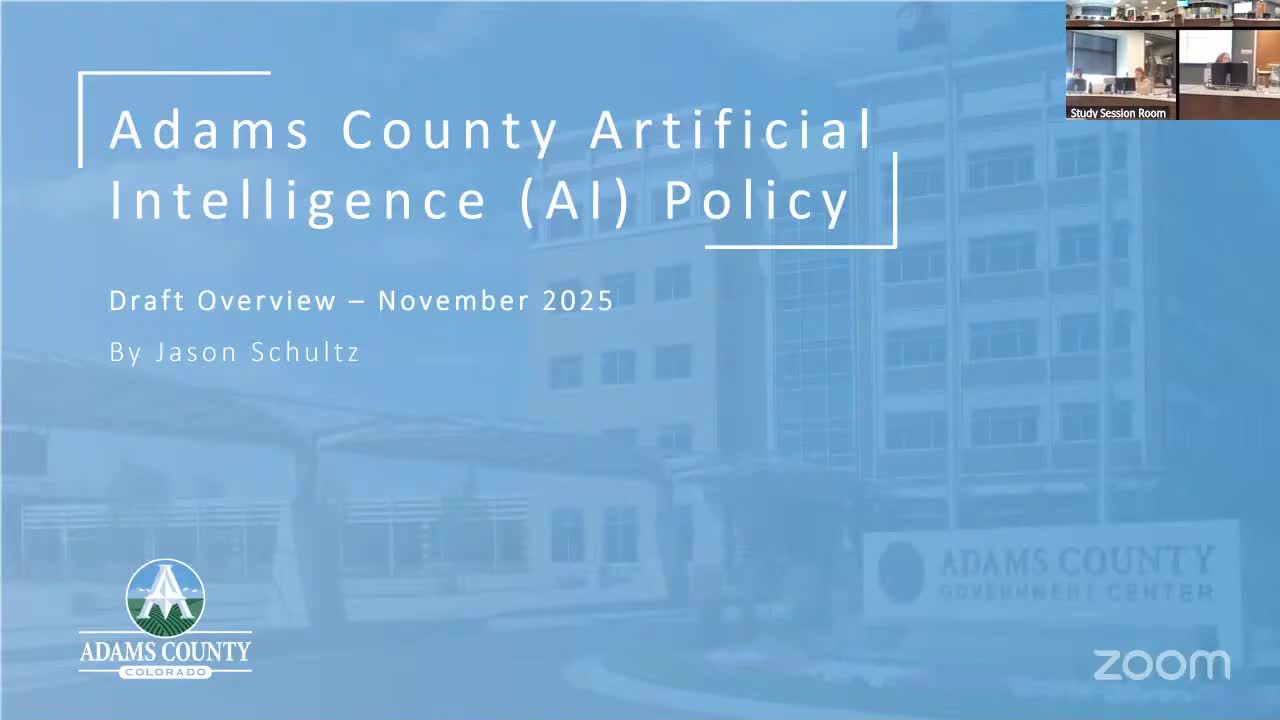Adams County reviews draft AI policy; staff to finalize language for January adoption
Get AI-powered insights, summaries, and transcripts
Subscribe
Summary
Adams County staff presented a draft countywide artificial intelligence policy at a Nov. 5 study session, outlining governance structures, vendor controls and a implementation timeline and asking commissioners for feedback before returning a final version for board consideration in January.
Adams County staff presented a draft countywide artificial intelligence policy at a Nov. 5 study session, outlining governance structures, vendor controls and an implementation timeline and asking commissioners for feedback before returning a final version for board consideration in January.
Jason Schultz, director of information technology and innovation, said the draft is built on three pillars: "to establish an ethical, transparent, and effective use of AI," "to enhance public services and operational efficiency," and "to ensure fairness, accountability, and public trust." Schultz cited academic research, a 2024 Department of Justice report and state guidance as sources informing the draft.
The draft would apply to county departments under the Board of County Commissioners and to third-party vendors used in public-service operations, Schultz said, and would require vendors to meet contract clauses on data ownership, privacy and intellectual property. He told commissioners that "all AI-generated content is subject to CORA," meaning it can be requested under the Colorado Open Records Act.
To oversee deployment, the policy proposes three bodies: an AI and data governance council to set standards; an AI strategy and innovation committee to evaluate candidate technologies and use cases; and an AI procurement and risk oversight board to manage contracts and vendor accountability. Schultz said those groups would review proposals in a staged process: strategic and technical review, ethics and data-governance review, procurement and risk review, then approval, logging, deployment and ongoing oversight.
Commissioners focused questions on bias, controls and enforcement. One commissioner asked how the county would address implicit bias baked into machine-learning models; Schultz replied that the second governing body would evaluate language models and training data, conduct testing and, where necessary, bring in independent consultants or work with vendors to mitigate known biases. He said human review would be required for all official uses and that the county will classify use cases by risk: prohibited (illegal or harmful activities), high-risk (evaluations of individuals, protected data) and medium-risk (internal drafting and research using only publicly available data).
Schultz described live pilots in a sandbox using Microsoft's Copilot to test how models respond to county data and said the county is limiting those environments so the tools do not access the wider internet during tests. "We trained a Copilot agent to just use that [spreadsheet] and then you could ask it questions," he said, describing the sandbox as a way to narrow scope and evaluate outputs before broader deployment.
On enforcement, staff said technical controls will be applied to county-managed devices and networks (for example, permitting only enterprise-licensed tools and blocking unlicensed chat services). They acknowledged limits on personal devices and said training, communication and a transition or "amnesty" period will be important to bring users into compliance.
Schultz proposed a timeline that calls for finalizing policy language by the end of the year, board consideration and a public hearing in January, implementation planning in the second quarter, establishment of governance groups in the third quarter, and broader implementation and enforcement in the fourth quarter of next year. Commissioners asked staff to provide regular updates after adoption; Schultz proposed an initial report at adoption and then quarterly or semiannual updates.
No formal vote was taken at the session. Staff requested written feedback within 30'60 days and said they would revise the draft based on comments before returning it to the board.
The draft policy packet and presentation are in the meeting materials; staff said they will coordinate distribution of a near-final draft for commissioner review before the public hearing.
